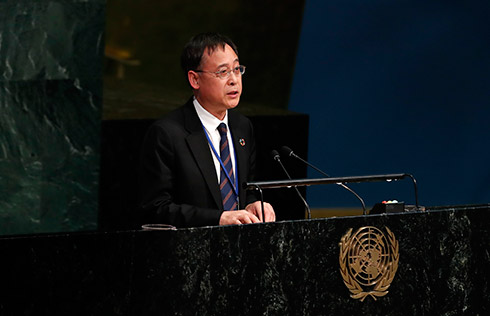China, Peru to research trade pact expansion
Xi says the nations should explore new areas like environmental protection and clean energy
China and Peru signed a range of agreements on Monday as the two countries agreed to begin joint research on ways to upgrade their free-trade agreement.
The signing ceremony was witnessed by President Xi Jinping, on a three-nation Latin American visit, and his Peruvian counterpart Pedro Pablo Kuczynski. They agreed to work more closely on areas like energy, trade, minerals, finance, industrial parks and infrastructure.
China also agreed to help provide equipment for an archaeological museum in Lima.
Xi said the Chinese government will continue to encourage Chinese business giants to invest in Peru, adding that the two countries should explore new cooperative areas such as environmental protection, clean energy and information technology.
Kuczynski said that Peru welcomes China's investments. He mentioned that Peru would like to see joint efforts to upgrade the nations' bilateral free-trade agreement.
The two countries signed a free-trade agreement in 2009. Since its launch in 2010, the agreement has achieved remarkable results, China's Ministry of Commerce said in a news release on Tuesday. Upgrading the agreement could inject new vitality in the two countries' trade relations, the ministry said.
China-Peru bilateral trade reached $16 billion in 2015 - more than double the amount of trade before the deal's initiation.
China is now Peru's biggest trade partner, export market and source of imports, while Peru is China's fifth-largest trade partner in Latin America, according to the ministry.
Margaret Myers, director of the China and Latin America Program at the Inter-American Dialogue based in Washington, noted China and Peru have a longstanding relationship based on Chinese immigration to the South American country, which goes back to the mid-19th century.
"Chinese trade has been evident in Peru for many decades, but the economic relationship developed especially rapidly over the past two decades. Chinese companies have been primarily interested in Peru's mining sector. Their copper mining investments have achieved varying degrees of success," Myers said.
Chinese exports, including high-tech equipment, are increasingly prominent in Peru, as are investments in infrastructure, Myers said.
Peru also has sought to export agricultural products, such as fruits and fish meal.
Myers says Peru needs to work toward attracting more diverse Chinese investments. "China's investment and trade with Peru remain focused on primary commodities," she said.
"Peruvian officials must work to attract Chinese investment, while ensuring that it is increasingly diversified, sustainable, and promoting long-term growth," Myers said.
Myers said that China already has shown some interest in investing in a wider variety of sectors not only in Peru, but across the region.
Zhang Zhihao in Beijing contributed to the story.
Contact the writers at [email protected]


























